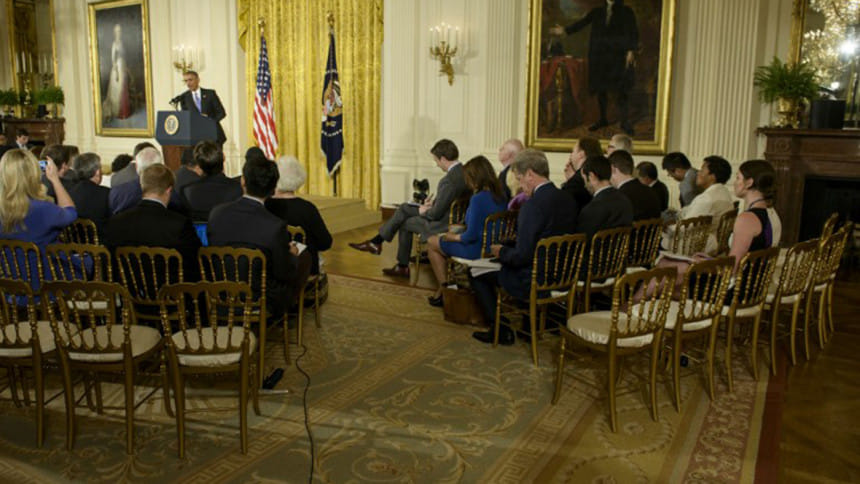Iran nuclear deal: '99% of world agrees' says Obama

Critics of the nuclear agreement with Iran are at odds with "99% of the world and the majority of nuclear experts", US President Barack Obama has said.
He challenged critics of Tuesday's deal to present a better alternative - seen as a veiled reference to his Republican opponents in Congress.
The UN Security Council will vote next week on a resolution endorsing the agreement, Iran says.
In return for an end to sanctions, Iran will limit its nuclear activities.
The president has said there will be a robust debate with Congress.
Diplomacy or war
His Republican rivals, who hope to scupper the agreement in a subsequent vote, have accused him of appeasement.
But Obama said: "If 99% of the world community and the majority of nuclear experts look at this thing and they say this will prevent Iran from getting a nuclear bomb, and you are arguing either that it does not or that even if it does, it's temporary then you should have some alternative."
He said he had not heard one and insisted there were two alternatives with the issue either resolved "diplomatically, through a negotiation, or it's resolved through force. Through war. Those are the options", he said.
He added the world would risk "even more war in the Middle East" without the nuclear agreement with Iran.
BBC North America editor Jon Sopel said the president came out swinging at a news conference on Wednesday, confident of his argument and keen to make the case that - on the central goal of stopping Iran obtaining a nuclear weapon - the agreement had to be supported.
The deal, reached with six world powers in Vienna, would begin to be implemented by November, Iranian Foreign Minister Mohammad Javad Zarif said earlier on Wednesday.
Iran's President Hassan Rouhani said the agreement proved that "constructive engagement works".
Israeli Prime Minister Benjamin Netanyahu, meanwhile, denounced what he called a "stunning historic mistake".
'Victory for Iran'
Obama has expressed hopes that the agreement would encourage Iran to "behave differently," citing "its support of terrorism and its use of proxies to destabilise parts of the Middle East."
He said that the US would seek greater co-operation from Tehran on ending the wars in Syria and Yemen. But he added: "We're not betting on it.''
He also urged members of the US Congress to judge the agreement "based on the facts, not on politics".
American lawmakers have 60 days to review the deal.
The UN Security Council passed six resolutions between 2006 and 2010 requiring Iran to stop producing enriched uranium, which can be used for civilian purposes, but also to build nuclear bombs.
After returning to Tehran, Zarif said: "These talks have concluded in a situation when the Security Council - for the first time in its history - will give official recognition to a developing country's enrichment programme through a resolution next week."
Diplomats told the Reuters news agency that the US would circulate a draft text on Wednesday that would terminate the previous resolutions but enshrine a mechanism for the sanctions they included to automatically "snap back" if Iran breached its commitments.
The five permanent members of the Security Council who could veto any resolution - the US, UK, France, Russia and China - were part of the so-called P5+1 group of world powers that signed the deal with Iran, along with Germany.
"We hope that more or less within four months, measures taken by both sides show results and implementation of the deal begins," Zarif said.
President Rouhani told a cabinet meeting that Iran had not "surrendered".
"The deal is a legal, technical and political victory for Iran," he said. "It's an achievement that Iran won't be called a world threat anymore."
Could US Congress torpedo the deal?
--It has 60 days to review the agreement
--During that time, President Obama cannot lift the sanctions Congress has imposed on Iran
--Congress can reject the deal, and keep the sanctions in place, but Obama can veto that
--Congress would need a two-thirds majority to overturn the veto, which is unlikely
But the Speaker of the US House of Representatives, John Boehner, said it would only "embolden" Iran.
"Instead of stopping the spread of nuclear weapons in the Middle East, this deal is likely to fuel a nuclear arms race around the world," he warned.
Meanwhile Netanyahu stressed that Israel would not be bounded by the deal, suggesting military strikes on Iran's nuclear programme remained an option. "We will always defend ourselves," he added.
The head of the International Atomic Energy Agency (IAEA), Yukiya Amano, told the BBC he was confident that its inspectors would be able to "detect any diversion or misuse of nuclear material in a timely manner".

 For all latest news, follow The Daily Star's Google News channel.
For all latest news, follow The Daily Star's Google News channel. 



Comments